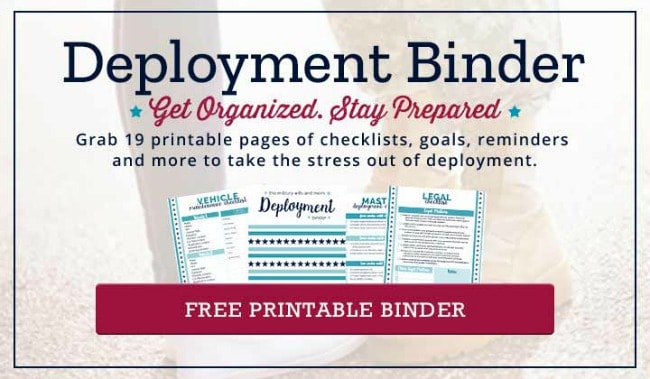You might hear this infamous stereotype time and time again—military spouses are lazy, uneducated, and by the way, they never work. It’s kind of irritating actually. Especially if you are a spouse, like most are, who is hard-working and supports her family equally as much as her spouse.
There are a lot of reasons why military spouses are both unemployed and under-employed, meaning most military spouses take jobs in which they are over-qualified because they cannot find work to match their skills.
Many of these lies and truths will resonate with you if you are a military spouse. They are after all based on a 2013 survey taken by military spouses. And if you are not a military spouse, I hope this post can shed genuine light on the real issues military spouses face in today’s job market. I hope these reasons help educate others and encourage us all to unite and find more reasonable solutions to this chronic issue.
Lie: Military spouse jobs are easy to find after moving.
Truth: Many military spouses are frequently out of work due to preparing for or recovering from a military PCS move.
I cannot tell you how many military spouses I know who found great jobs in their local area, worked hard, made advancements, and then had to quit a year or two later due to a PCS move. With each military mandated move, military spouses are forced to start over in the job market. Looking for work in a specialized field of work takes time and energy.
Recently, a friend left her job as a nurse one month before a PCS move. Following the PCS she worked hard to find employment and landed a job within a few months. The problem is the government agency took over 6 months to complete her hiring process. This is the norm for many government agencies. So from the time this spouse left her job until she officially started getting paid, we are talking 9 months. That’s crazy when you realize she will likely move again within 2 years of starting the position. A 9 month gap in employment is a long time for a military spouse with an education and excellent work experience in a job market that has openings. What does the employment gap look like for spouses with less than ideal circumstances?
Are you a small business owner, a marketing manager, a cosmetologist, a financial planner? These jobs provide limited positions and make it challenging to get hired after moving around from duty station to duty station.
Lie: Military spouses use their service member’s job as an excuse not to find work.
Truth: Military spouses cannot find work flexible enough to accommodate their spouse’s schedule.
A 2013 study discovered “there is not a lack of desire to work that is causing these gaps; over 55% of respondents indicated they “need” to work, while 90% indicated they “want” to work.” (Source).
I believe that most military spouses would love to work if the right circumstances presented themselves. Like many military spouses, I gave up my career to stay-at-home full time. Given the stress that my husband’s military career puts on our family, we agreed together that having one spouse home full-time to manage the children, the household, and all of our general life affairs was imperative to our long-term happiness. Many military spouses want to be able to stay home and care for their children because it’s what is best for the whole family, not because it’s easier than working at a conventional job.
Lie: Military spouses get hired equally as much as civilians.
Truth: Military spouses actively seeking employment experience countless challenges.
Many organizations are ambivalent over hiring military spouses, knowing they won’t be around for long. It’s plain and simple: Companies want to invest in long-term employees in in order to avoid costly expenses associated with high employee turnover.
In addition, many organizations are reluctant to hire prospective employees with short employment stints and gaps in unemployment all over their resume. Military life takes the everyday career woman’s resume and makes it look shady.
“In 2012, 18-24 year-old Armed Forces female spouses had the highest unemployment rates at 30 percent (which is almost three times higher than their civilian counterparts at 11 percent). 25-44 year-old Armed Forces female spouses had the second highest unemployment rates at 15 percent (almost three times higher than their civilian counterparts at 6 percent).” (Source)
Lie: Military spouses don’t make an effort to obtain an education.
Truth: Military spouses struggle to obtain an education more than civilian counterparts.
There are so many military spouses who leave college behind to PCS with their service member. With frequent mandatory PCS moves, many military spouses leave behind countless college credit hours. Some leave college behind altogether, while others frequently start over at a new university.
The biggest problem is often that a military spouse cannot complete a degree at a given university or college before it’s time to PCS again. At this point, spouses often leave a university, transfer as many credits as possible, and start again. It’s incredibly frustrating that credits do not transfer from university to university. A military spouse may take a class over and over again, despite passing on the first go around.
Nowadays, many military spouses are turning to online college degree programs to better meet their needs. This is a great option for spouses coping with frequent moves, but at the same time, it’s unfortunate that spouses are not able to enjoy a traditional university experience.
Lie: Military spouses turn down jobs they think are beneath them.
Truth: Military spouses cannot find work that match their skills and education.
Even after obtaining an education, it’s still be a struggle to find job. 90 percent of working military spouses report being underemployed. This means that military spouses possess more formal education/experience than needed at their current or most recent position.
Moving from duty station to duty station it’s challenging to find work in a niche specific area. And if you think all military spouses should just go work at just any under-paying job that comes their way, then you might as well say service members should get out of the military and go work at Banana Republic.
Even more discouraging is finding jobs at OCONUS duty stations. At our current overseas duty station, qualified local citizens are given hiring preference over equally qualified military spouses. So even if someone wanted to argue that military spouses should just go work at the PX, I can confidently tell you that at some duty stations that is not even an option. Those jobs are already filled and offered to local citizens.
What needs to be done?
Military spouse unemployment and under-employment is an issue deeply rooted in the military community. This is not an individual military spouse issue in my opinion. Here are a few realistic solutions that I believe could make a huge improvement for military spouses across the board:
- Decrease the frequency of PCS moves.
- Offer greater resources for military spouses to obtain an online education that will transfer from duty station to duty station.
- Offer greater employment placement assistance for military spouses.
- Offer more military spouse jobs through government agencies that are work from home and transfer from duty station to duty station.
- Increase access to childcare, offering flexibility for military spouses with unconventional working hours.
- Increase military spouse hiring preference for government jobs.
Want more on military life?
- 43 Awesome Tips Every New Military Wife Needs to Know
- The One Phrase That Will Reconnect Your Military Marriage
- 18 Ways Military Life Changes You for the Better
- 7 Myths About Military Life…Debunked
What do you think is the real reason military spouse unemployment is so high? Let’s chat in the comments!








Actually I disagree with your on the Education front. In study after study it has been proven that military spouses are more educated than their civilian counterparts. They have more degrees per capita than non military spouses, so that is one of the reasons why lack or employment or underemployment is again such a big blow. They have the qualifications, moreso than their counterparts, yet not only are they not more highly employed, they are less employed.
Lauren I am so glad to have found your website. I met my wife when she was stationed in Hawaii, we dated for two years and then the assignment for Germany came up. Excited for Europe adventures, we decided to get married and go for it. I was sad to leave the place I grew up, along with all my family and friends. But perhaps most of all, I was sad to leave my career. 10+ years in the automotive sales industry, I had an established clientele, and well, easily made 2.5x more annually than my wife.
We’ve been in Germany since January of this year, and the only positions I can find on-base are for food-service, custodial work and child/youth program assistants. All ranging from $8-11/hr. I haven’t worked for that kind of money anywhere in a decade. It’s incredibly frustrating to think that my best options might not even be worth the unhappiness of going to a menial job everyday. Do I go back to the States and continue my career? Allowing me to have some pride in contributing financially to our family and helps us to put aside money for later on down the road? Or do I stay here in Germany and accept the decision we made to come here, and stick with my spouse (who admittedly is having a much easier time adjusting to life here because she has somewhere to go 5 days a week)? It’s a lot to consider. None of it is easy.
Thanks for doing what you do with this blog. I’m still very much frustrated with my own situation, but after reading through a few articles, am finding comfort in this wide network of opinions, advice and well-wishes.
Hi Lauren,
I’m a new reader (and newish milspouse, my husband has been in for 2 years). I’ve got a year until graduating with my BS in web + mobile programming. I am currently working a PT job at a history museum. I’ve had no trouble finding a job as a milspouse, but finding a relevant job commensurate with my professional experience, not so much. Very interesting to read your post and all the comments from the other spouses. The employment challenges are a large part of why my husband and I don’t plan to go career active duty. Our plan is for him to finish his degree with TA during this contract, then go National Guard so we can keep Tricare coverage and he can get additional educational benefits for grad school. Since we’ve been married I’ve seen less of him than when we were dating long distance between universities in different cities. It has been an adventure and given us a lot (debt-free education, incredible friendships, personal growth) but I’m 22 and I’ve already had about enough of the constant moves, never knowing if travel plans will be ruined last minute, poor communication, etc. Not that the Army no longer does pensions for soldiers who joined after Jan 1 2018, going career just isn’t that appealing. It’s been a crazy and wonderful adventure but we plan to design our own adventures after this contract is up.
You’ve hit the nail right on the head with this!
The constant PCS’ing is probably one of the biggest challenges in being a military spouse who wants to work! My husband has gotten the short end of the stick, only living in a duty station for no more than a year and a half for the last 4.5 years. We were due to move again with his submarine this month, which has changed, again, because of an injury. We could have anywhere from 3 months to 2 years left at our current station depending on decisions made by the medical board for this injury. The most frightening questioned I could be asked right now, or at any duty station really is “how long will you be stationed here”. This has made securing a job in my specific career field remarkably hard. We take it month by month, but with no major responsibilities aside from our dog, not working would make life unbearably boring.
It would be so nice to have government employers specifically for spouses who can relocate with ease and not have to worry about spotty employment records: gaps, multiple jobs in a short time, inconsistent positions not related to education, etc.. It would also be beneficial for said agencies to have resources for spouses who don’t have such secure futures as others. Being a military spouse can be so difficult at times but it can be so rewarding. I cannot stress the importance of having more resources available for the working spouse.
This article is everything! I was able to obtain a DoD job at one my husband’s duty stations, which made me think getting another government job would be MUCH easier. That’s definitely not true! Not only am a more than qualified, but I also have a few years experience experience working for DoD to do the jobs I’ve applied for. In the last few months, I’ve applied for probably 50 jobs like the one I was working. Every one responded that I was either not experienced enough or I just never heard anything back at all. We’re stationed in Hawaii now. And I can tell you that you’re absolutely 100% correct about the hiring of only local people. I even have a TS clearance and haven’t had any luck. Congress needs to treat military spouses far better than it does. It’s disgusting!